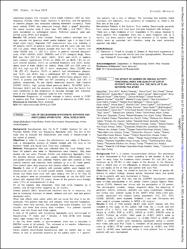The effect of gender on disease activity, functional index and quality of life in patients with axial spa. the data of tlar-network psa study

Göster/
Erişim
info:eu-repo/semantics/openAccessTarih
2019Yazar
Nas, KemalKılıç, Erkan
Tekeoğlu, İbrahim
Çevik, Remzi
Sargın, Betül
Kasman, Sevtap Acer
Alkan, Hakan
Şahin, Nilay
Üst veri
Tüm öğe kaydını gösterÖzet
Background: PsA is a chronic musculoskeletal disease. The prevalence
of axial involvement in PsA varies according to the duration of the disease. In early stage the incidence varies between 5% and 28%, but it
increases up to 25-70% in later stages of the disease. In the literature,
there is limited data on the differences in disease activity, functional status and quality of life of men and women with axial PsA.
Objectives: In this study, we aimed to evaluate the effect of gender difference on clinical findings, disease activity, functional status and quality
of life in patients with axial involvement in Turkey.
Methods: Patients with PsA who met the CASPAR classification criteria
were enrolled consequently in this cohort. Turkish League Against Rheumatism (TLAR)- Network was formed with the participation of 25 centers.
The demographic variables, fatigue, diagnostic delay, the beginning of
peripheral arthritis, enthesitis, dactylitis and spine involvement, inflammatory lumbar pain, patients‘ quality of life, BASFI, HAQ, HAQ-s,VAS pain,
anxiety, depression and disease activity parameters (TJC, SJC, ESH,
DAS28, BASDAI), were recorded. Student’s t test and Chi-square test
were used to compare variables in SPSS v.22 program.
Results: A total of 1130 patients (36.0% male, 64.0% female) with PsA
included in this study. In this cohort, 169 male (46 ± 12.29) and 251
female (47.4 ± 12.11) had axial involvement. VAS pain (p <0.001),
fatigue (p <0.001), ESR (p <0.001), DAS28 (p <0.001), BASDAI score (p
<0.001), PsAQoL (p <0.001), HAQ score (p <0.001), HAQ-S score (p
<0.001), anxiety (p <0.001), depression (p <0.020), FACIT (p <0.001) and
FIRST (p <0.001) scores were statistically significantly worse in women
than males with axial PsA (Table 1). However, SF-36 physical component
score (p <0.001), SF-36 mental component score (p <0.001) and PASI
score (p <0.005) were statistically worse in male patients than in female
patients with axial involvement.
Kaynak
Annals of The Rheumatic DiseasesCilt
78Sayı
Supplement: 2Bağlantı
https://doi.org/10.1136/annrheumdis-2019-eular.8305https://hdl.handle.net/20.500.12462/11045

















